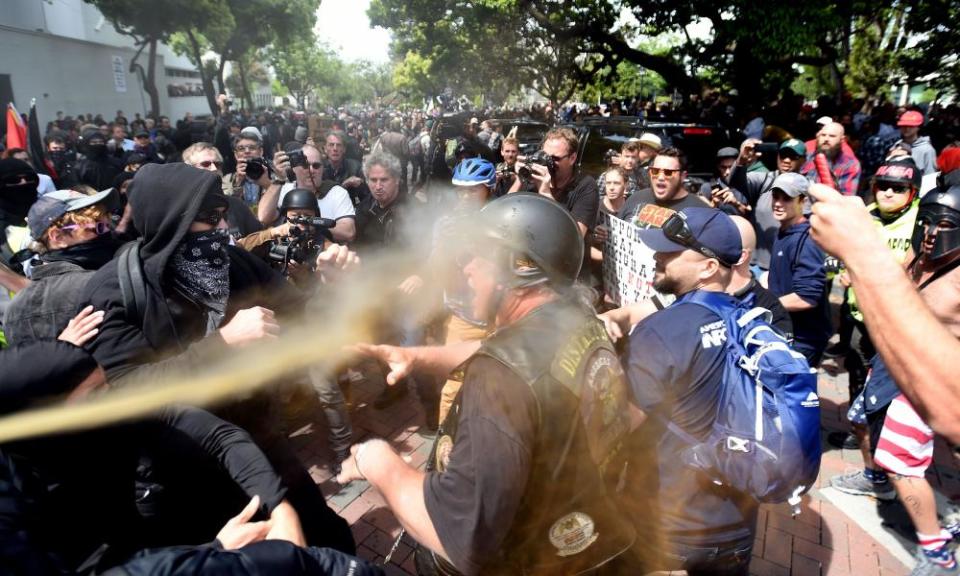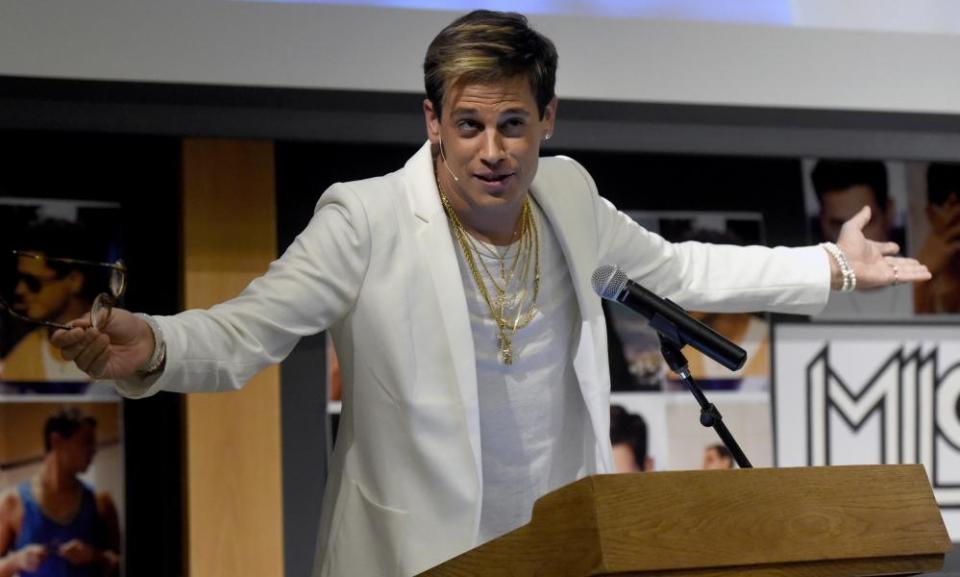Ann Coulter cancels speech (again) – but battle for Berkeley's political soul rages on
As Coulter canceled a contentious appearance and in the wake of protests over Milo Yiannopoulos, the far right is using ‘free speech’ as a rallying cry

Ann Coulter has canceled a speech that had been planned for Thursday on the University of California’s Berkeley campus after initially claiming she would defy the administration’s request that she hold her event a week later at a secure venue.
“There will be no speech,” the rightwing commentator told Reuters in an email, blaming her reversal on conservative groups that had originally said they would sponsor her talk but apparently withdrew their backing.
“I looked over my shoulder and my allies had joined the other team,” she added.
The cancellation will come as a relief to university officials who had feared Coulter’s determination to appear on campus at a time and place of her choosing would result in violent confrontations.
But for a city that just two weeks ago saw violent clashes between attendees of a rally that included white supremacists, Trump loyalists and militia members and counter-protesting anti-fascists, the temporary deescalation of tensions is likely temporary.
The college town so deeply liberal that it is referred to as “the people’s republic of Berkeley” is now a favored destination for the far right, resulting in a number of violent encounters on the city’s streets and the University of California’s flagship campus.
The table was set for the Coulter controversy in early February, when the Berkeley College Republicans hosted a speech by former Breitbart editor Milo Yiannopoulos. Thousands of students turned out to protest against the rightwing provocateur, and the speech was cancelled after a group of masked protesters shot fireworks, threw rocks and set fires around the venue.
The cancellation, which the university said was due to safety concerns and not Yiannopoulos’s political views, nevertheless drew cries of outrage over the alleged suppression of free speech on a college campus. Donald Trump tweeted about the affair, including a veiled threat that the public university could lose federal funds.
Casting the controversy over Yiannopolous as one of freedom of speech has been a public relations coup for the right.
“It has an almost irresistible propagandistic value,” said Larry Rosenthal, the chair of the UC Berkeley Center for Right-Wing Studies, by providing the right an opportunity to “talk about the hypocrisy of liberals with respect to free speech”.
Indeed, the Berkeley College Republicans have made the most out of the perceived hypocrisy of the university, which was the birthplace of the campus free speech movement in 1964. The group’s Facebook page features a video about the speech cancellations and protests set to the mournful strains of the Moonlight Sonata, with the caption, “Berkeley Hates Free Speech”.
“We are the new free speech movement,” said Naweed Tahmas, a Berkeley political science major and spokesman for the group. His organization filed a lawsuit against the university, arguing that the school’s requirements that the speech be held during daytime and at a certain venue violate the rights to free speech, due process and equal protection under the law.
He also complained that the Berkeley police had not been more proactive about the protests at the Yiannopoulos event, saying that when he and others were escorted from the venue, “protesters shouted: ‘Fuck the Berkeley College Republicans’”.
“The university should have made more arrests.”
Yiannopoulos has seized on the free speech issue as well, declaring that he will return to Berkeley for a “free speech week” and give out a new award named after Mario Savio, one of the key student leaders of the free speech movement.
The adoption – or co-optation – of the free speech movement has raised some eyebrows.
Daniel Savio, the son of Mario Savio and a composer, called the idea of Yiannopoulos’s award “some kind of sick joke”.
Savio argued that while his father would have broadly supported all people’s rights to speak on campus, there are limits when it comes to speech that directly threatens vulnerable people. Yiannopoulos has previously targeted individual transgender students for harassment.

“Is freedom of speech such an important principle that we can afford to uphold it even when it means sacrificing the safety of some other folks?” Savio said.
Robert Cohen, a history professor at New York University who has written several books about the free speech movement, said that he saw the current contretemps as a “free speech hustle”.
“The free speech tradition that people made sacrifices to win is really in tatters,” Cohen said. He blamed the devolution on the “short-sighted” reactions of the left and the “opportunistic and cynical game that these rightwingers are playing”.
When the university voted to allow political speech on campus in 1964, he said, they also insisted that the administration be allowed to regulate the “time, place and manner” of such activity so as not to interfere with the normal functioning of the university.
“If I want to have a rally, I can’t do it in your English class,” Cohen said. “If having an evening talk by a rightwing bigot is going to do $100,000 in property damage and disrupt the university, they have always had the right to say, no, do it during the daytime.”
This argument was echoed by Dan Mogulof, a university spokesman, who said that Coulter was “welcome on this campus” but that the college Republicans had not consulted with the administration to find an appropriate date and venue before booking the speaker, making it difficult for them to ensure public safety.
In a city with a well-developed anti-fascist activist base, rightwing groups – including militia organizations, the “alt-right”, white nationalists and Trump supporters – appear to have had a realization. In part because of the “antifa” ethos that extreme rightwing movements must be confronted by any means necessary to stop fascism, rightwing groups are nearly guaranteed a confrontation – and headlines.
But beyond the violence and beyond the rhetorical struggle for the moral high ground, Rosenthal argued, some extreme rightwing figures were targeting the city because they view streetfighting as a precursor to a radical rightwing revolution, as was seen in the Weimar Republic in pre-Nazi Germany.
“The most significant element in the definition of a classic fascist movement is the marriage between an electoral party and a private militia,” Rosenthal said. The Republican party has not definitively distanced itself from the far right, he pointed out, while streetfights can foster the formation of militias.
“What Richard Spencer saw in what happened in Berkeley was the germ of the ‘alt-right’ beginning to form both sides of that marriage.”
James Anderson, an editor of itsgoingdown.org, an anti-fascist news site, pointed out: “The only thing that does bring these people together is the idea of attacking the left, attacking anarchists, attacking anti-fascists. That’s the one point of unity.”
The school at least seems resigned to confronting its role as host as it attempts to stay true to its principles of academic freedom.
“We can’t isolate and hermetically seal ourselves off,” Mogulof said. “This is the reality of the world we live in.”

